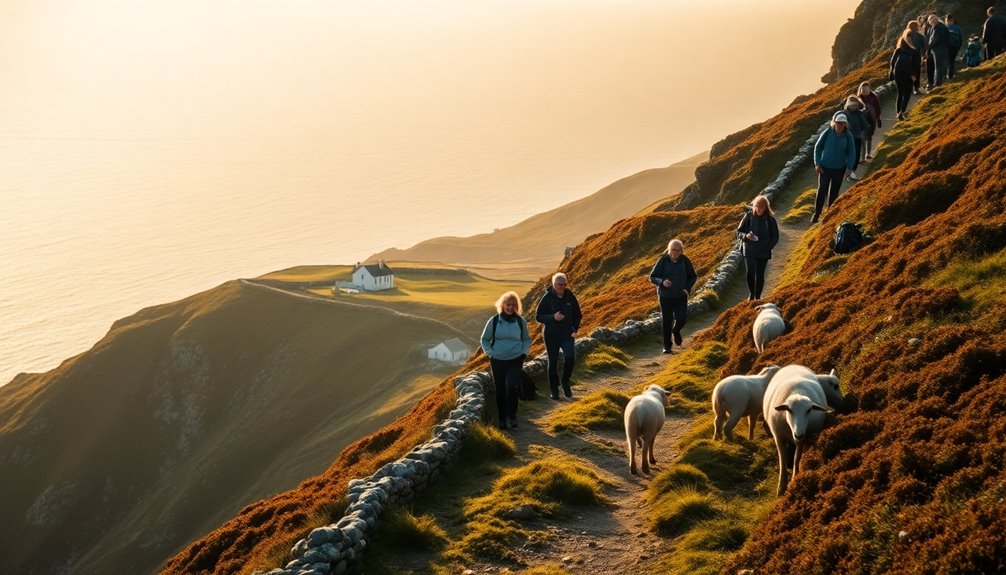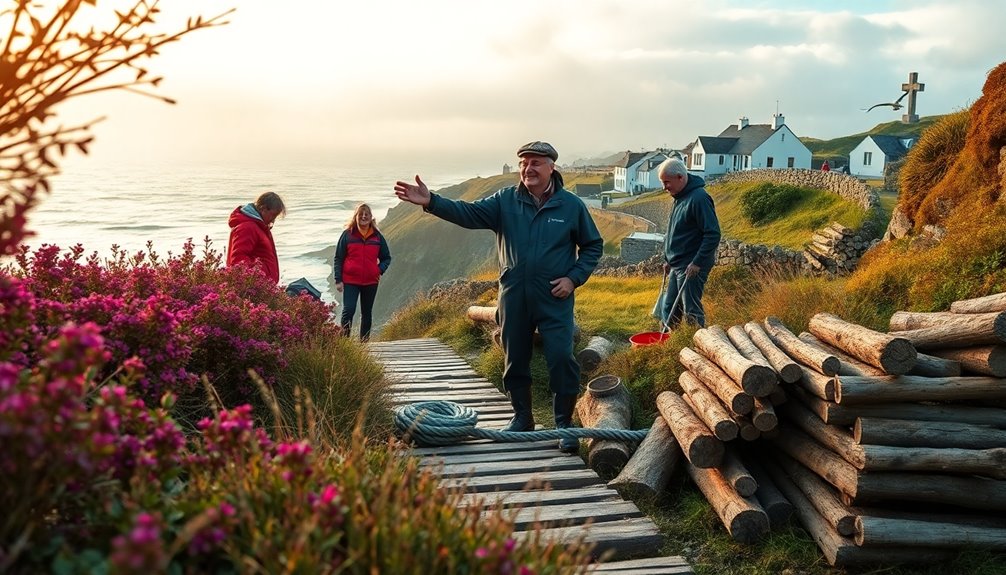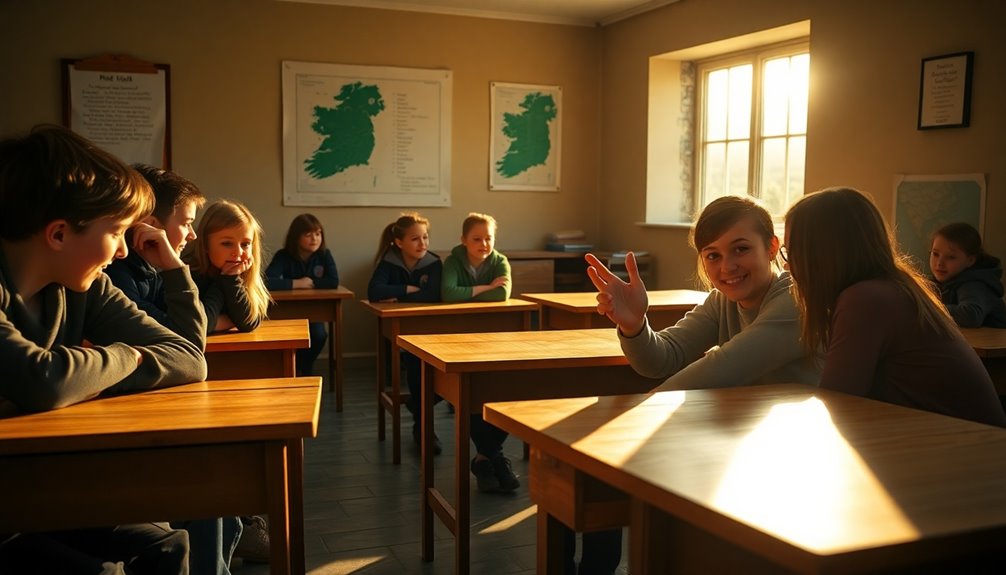
You can get fluent fast by volunteering in places that force you to use Irish every day: homestays, Gaeltacht festival shifts, youth camps, school assistant roles, conservation projects and social enterprises. You’ll learn grammar through tasks, pick up idioms in pubs, and practice through songs, cooking and community workshops. Remote prep roles and digital content work build confidence before you go. Keep going and you’ll discover specific programs, roles and tips to make it happen.
Highlights
- Volunteer at Gaeltacht festivals to immerse in workshops, music sessions, and daily Irish conversation with locals.
- Join homestay programs where household tasks and shared meals force conversational Irish practice naturally.
- Teach or mentor in youth camps to build conversational fluency through games, drama, and active leadership.
- Work in community social enterprises (cafés, co‑ops) using Irish in real-world customer and team interactions.
- Participate in environmental conservation projects for hands‑on language use while engaging in local stewardship.
Volunteer Programs That Double as Intensive Irish Courses
When you sign up for a volunteer program that doubles as an intensive Irish course, you’re not just learning grammar—you’re living the language. You wake to Gaelige in the air, join cultural exchanges that stretch your comfort zone, and spend afternoons in focused language workshops sharpening speech. You’ll teach, clean, cook, or guide, but every task becomes practice—raw, necessary, freeing. Immersion strips formality; you pick up idioms at pubs, melodies in classrooms, solidarity in shared work. You leave with fluency and autonomy, having traded passive study for active belonging and real-world linguistic freedom.
Community Projects Where You Learn Irish by Doing
Volunteer placements that teach through service naturally lead into community projects, where language learning is embedded in everyday tasks and local initiatives. You’ll join gardening co-ops, heritage walks, youth workshops, or festival crews, practicing Irish while solving real needs. This setup favors community engagement and hands-on cultural exchange: you teach, learn, paint murals, run stalls, or document oral histories, all in Irish. You gain fluent phrases tied to action, friendships that free you to speak, and a sense of purpose beyond classrooms. It’s immersive, practical, and liberating — language learned through doing, not memorizing.
Homestay Volunteering for Daily Language Practice
You’ll live with native speakers and pick up everyday expressions you won’t find in textbooks. Helping with household tasks gives you natural chances to speak—cooking, shopping, or gardening become language lessons. That steady, informal practice will sharpen your ear and make Irish feel like part of daily life.
Live With Native Speakers
Although staying with a native family can feel intimidating at first, it’s one of the fastest ways to absorb everyday Irish — from kitchen banter and local idioms to the rhythms of conversation you won’t find in textbooks. You’ll join a living language exchange where phrases slip into your speech naturally, and cultural immersion happens between meals, walks, and evening stories. You get freedom to experiment, make mistakes, and grow in a supportive household that values your curiosity. Set clear expectations, be respectful, and lean into spontaneous chats — that’s where fluency starts and confidence takes flight.
Help With Household Tasks
When you pitch in with daily chores—cooking, sweeping, tidying the garden—you get constant, low-pressure chances to use Irish in real situations: asking for tools, following instructions, chatting about meals or weather. You’ll share rhythms with hosts, trading short phrases while doing household chores together, locking language practice into routine. Tasks feel practical, freeing you from self-conscious study; mistakes get smoothed by laughter and correction. You’ll learn vocabulary tied to action, hear natural intonation, and build confidence through repetition. This homestay approach blends work and immersion, giving you agency to shape how much you do, learn, and explore.
Youth Camps Focused on Conversational Irish
If you want to immerse yourself in Irish quickly, youth camps built around conversational practice are unbeatable: they throw you into a lively, supportive setting where games, drama, and everyday tasks force you to think and speak in Gaelic without overloading you with grammar lectures. You’ll join energetic sessions that prioritize youth engagement and language games, so speaking feels like play, not work. You’ll mentor teens, lead activities, and share free-form conversations that sharpen fluency. The pace is immersive but relaxed — perfect if you crave freedom, hands-on learning, and real-world Irish that sticks because you lived it, not memorized it.
Heritage Site Volunteering With Gaelic Interpretation Roles
Because you’ll be explaining history to visitors in Gaelic, heritage-site volunteering thrusts you into authentic, purposeful use of the language: you lead tours, interpret exhibits, and answer questions in Irish while surrounded by the very landscapes, artifacts, and stories that shaped the tongue. You’ll practice natural speech, expand vocabulary tied to place, and gain confidence speaking publicly. This role blends heritage interpretation with hands-on cultural preservation—you’re translating past lives into living speech. You’ll move freely between narration and conversation, guiding curious minds, shaping visitor experience, and claiming the language as a daily, liberating tool rather than a classroom relic.
Arts and Culture Initiatives Teaching Language Through Creativity
Moving from guiding visitors through ruins and relics, you can bring Irish to life through creative practice—arts and culture projects let you use the language as a tool for making, not just explaining. You’ll lead workshops, co-create performances, or design zines where Irish frames stories, music, and visuals. This hands-on creative expression frees you from classroom formality; you learn by doing, improvising, and collaborating. Cultural exchange happens naturally as locals and volunteers swap techniques, slang, and songs. You leave with practical fluency, new artistic skills, and the confidence to speak Irish in bold, inventive ways.
Environmental and Outdoor Volunteering With Local Gaeltacht Hosts

You’ll get your hands dirty alongside local hosts on conservation projects that teach both practical skills and everyday Irish. Coastal clean-ups and habitat restoration stays turn shared labor into natural conversation, as you learn place names and ecological terms in context. These outdoor rhythms offer a direct, meaningful way to practice the language while caring for Gaeltacht landscapes.
Conservation Work With Hosts
When you join a conservation project in a Gaeltacht, you’ll spend your days outdoors helping restore habitats, maintain trails, and monitor wildlife alongside local hosts who live and breathe the landscape and language. You’ll plug into community-led conservation initiatives that blend practical work with cultural preservation, learning place names, seasonal skills, and stories in Irish. Tasks are hands-on, varied, and freeing — mapping peatbog recovery, planting native species, or tracking birds. You’ll move with purpose, guided by hosts whose patience turns mistakes into lessons. In return you gain fluency rooted in land, friendship, and shared stewardship.
Coastal Clean-Ups Together
After days spent restoring bogs and trails, head for the shore with your hosts to join coastal clean-ups that pair hands-on work with conversation in Irish. You’ll pick plastic from dunes, sort recyclables, and learn names for birds and seaweeds, feeling the salt and freedom of open sky. Local guides teach you simple phrases while you care for coastal habitats, turning labor into lively talk. These events are practical, social, and rooted in community engagement; you leave with cleaner beaches, sharper language skills, and friendships that make the Gaeltacht feel like home.
Habitat Restoration Stays
Though the work can be steady and hands-on, staying with a local Gaeltacht host to restore habitats immerses you in both landscape and language: you’ll help plant native species, mend erosion-prone paths, and rebuild peatland features while hearing and practicing Irish in real moments—on tool breaks, during walks, and over shared meals. You’ll rise with weather, learn names for plants and birds, and feel the tangible ecological impact of your labor. Days balance purposeful work with free afternoons to explore. It’s honest, rugged immersion where language grows naturally as the place heals, and you leave lighter, wiser.
Teaching Assistants and Language Mentors in Schools

Because learning a language happens most naturally in relationships, teaching assistants and language mentors bring Irish to life in classrooms and corridors, supporting you and students with conversational practice, cultural context, and tailored help during lessons. You’ll guide small groups, model pronunciation, and spark curiosity, accelerating language acquisition through real moments rather than drills. Mentors share stories, songs, and local customs, making cultural exchange immediate and joyful. You’ll enjoy flexible routines, creative lesson tweaks, and the freedom to improvise when a student’s question opens a new path. This role lets you teach, learn, and breathe Irish into everyday school life.
Social Enterprise Placements Prioritizing Irish Communication
While teaching assistants and mentors bring Irish into school life, social enterprise placements give you a chance to use the language in real-world work—cafés, community projects, and creative hubs that operate through Irish. You’ll choose roles where Irish is the medium, so every shift, meeting, or event sharpens fluency. These placements blend social impact with practical skills: running a bilingual café, coordinating youth workshops, or marketing artisan goods in Gaeilge. You gain autonomy, build networks, and support language preservation by embedding Irish in everyday economic and cultural life. It’s immersive, purposeful, and liberating—work that teaches while it changes communities.
Short-Term Immersion Stints at Gaeltacht Festivals
Festival weekends in the Gaeltacht drop you straight into Irish-speaking life: workshops, music sessions, and pop-up classes force you to listen, respond, and join in from the first hour. You’ll volunteer on-site, running stalls, guiding visitors, or helping stage events, all while surrounding yourself with daily Gaeilge. Gaeltacht festivals accelerate learning through immersion, informal correction, and joyful practice. You’ll trade skills and stories in true cultural exchange, meet locals who value freedom and creativity, and leave with usable phrases and memories. Short stints suit explorers: intense, freeing, and clarifying whether deeper commitment feels right for you.
Remote Volunteer Roles That Prepare You for In-Person Immersion
You can build real-world fluency from home by acting as a virtual conversation partner, practicing everyday phrases and listening for natural speech rhythms. Creating digital content—social posts, lesson videos or bilingual newsletters—sharpens your vocabulary and gives you a portfolio to share with immersion organisers. And coordinating remote events teaches the logistics, networks and cultural sensitivity that make in-person stays smoother and more meaningful.
Virtual Conversation Partners
Looking to sharpen your Irish before you land in an immersion setting? You’ll join virtual language exchanges that match you with native speakers and fellow learners, practicing real conversation without pressure. Online Irish chats let you experiment with phrases, accents, and slang while traveling time zones and schedules freely. As a volunteer partner, you give and get feedback, build confidence, and learn cultural cues that textbooks miss. Sessions are flexible, conversational, and focused on spoken fluency so you arrive ready to jump into in-person immersion. It’s a liberating, low-stakes way to make your Irish feel lived-in.
Digital Content Creation
If virtual conversations sharpen your ear and timing, creating digital content lets you shape how Irish reaches people—while sharpening your own language skills. You’ll craft podcasts, short videos, and micro-lessons that carry voice, rhythm, and idiom into everyday life. Digital storytelling teaches you narrative choices, concise phrasing, and cultural nuance; producing content forces revision, clarity, and audible confidence. Teach through online workshops, record bilingual scripts, and test rhythms that’ll serve you in live immersion. You’ll work freely, from anywhere, honing vocabulary and storytelling instinct so when you step into in-person Gaeltacht life, your language feels practiced, purposeful, and alive.
Remote Event Coordination
While organizing events from afar, you’ll learn the logistics, timing, and people-skills that make Gaeltacht gatherings run smoothly—skills that transfer directly to in-person immersion. You’ll practice remote coordination strategies: scheduling across zones, briefing hosts, and troubleshooting tech so attendees feel seen. Online event management teaches you to craft welcoming agendas, recruit local volunteers, and read a room through chat and cameras. These tasks build independence and confidence, so when you arrive in person you move freely, lead conversations, and adapt to spontaneous moments. Remote coordination becomes your rehearsal for living the language, not just attending it.
Some Questions Answered
How Do Visa Requirements Differ for Non-Eu Volunteers in Ireland?
Visa types and application process vary: if you’re a non‑EU volunteer you’ll usually need a Short Stay C visa for under 90 days or a Long Stay D visa for placements longer than 90 days. You’ll follow an application process including proof of placement, finances, insurance and sometimes Garda vetting. You’ll apply via the Irish embassy/consulate or online, submit documents, pay fees and wait for approval—plan ahead to keep your freedom intact.
Can Beginners With Zero Irish Join Immersion Volunteer Programs?
Yes — you can join as a complete beginner. I once watched a nervous volunteer grow like a sapling into a fluent speaker after daily chats with locals; that story shows how beginner experiences can quickly transform. You’ll get immersion benefits from constant practice, cultural tasks, and patient mentors, so you’ll gain confidence, freedom, and real-world skills even if you’re starting at zero. Jump in; they’ll meet you where you are.
Are There Scholarships or Stipends for Volunteers in Gaeltacht Areas?
Yes — you can find scholarships and stipends for volunteers in Gaeltacht areas. You’ll discover funding opportunities through local Údarás na Gaeltachta programs, cultural trusts, and some host organizations that offer volunteer incentives like travel grants, small stipends, or accommodation support. Hunt community notices, university partnerships, and language charities. If you’re seeking freedom to roam and live Irish, these options lighten costs and let you focus on immersion and meaningful contribution.
What Safety and Health Provisions Exist During Rural Placements?
You’ll want to know this—there’re clear health regulations and safety measures in place. Hosts usually provide emergency contacts, basic first aid kits, risk assessments and orientation sessions. You’ll get guidance on local medical facilities, travel protocols and insurance requirements, plus campsite or homestay safety rules. If you’re doing physical work, PPE and supervision are standard. You’ll also have reporting channels for incidents and mental-health supports when needed.
Can Volunteer Hours Count Toward University or Professional Credits?
Yes — volunteer hours can often count toward university or professional credits if you arrange credit transfer or volunteer recognition in advance. You’ll need to coordinate with your academic advisor or certifying body, document tasks, and sometimes complete assessments or reflections. Programs with formal partnerships or detailed learning outcomes make recognition smoother. Push for transparent agreements upfront so your time converts into official credit, keeping your freedom to choose meaningful work intact.
Summing Everything Up
You might’ve heard that living in a Gaeltacht is the only real way to learn Irish — but volunteering shows that’s half-true. By immersing yourself in community projects, homestays, camps or heritage roles, you get continuous, meaningful use of the language while giving something back. Try remote prep placements first, then jump into short festival or school stints: you’ll find fluency grows faster when practice is purposeful, social, and rooted in daily life.
